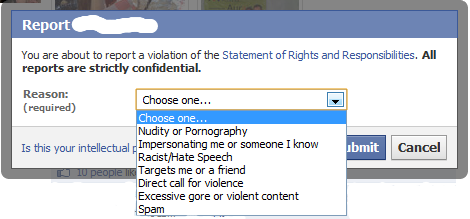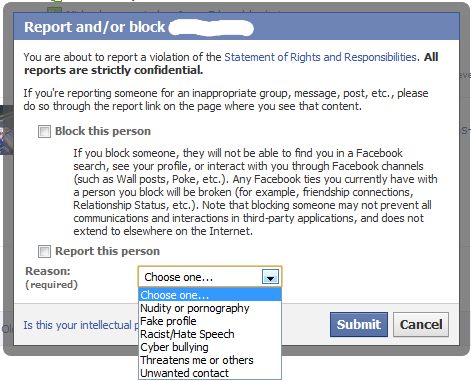Sen. Amy Klobuchar just released a letter to Facebook demanding the site require "a prominent safety button or link on the profile pages of users under the age of 18"--akin to the so-called "panic button" app launched earlier this week by the UK's Child Exploitation & Online Protection Centre (CEOP). She doesn't seem to realize that this app is available to all Facebook users, not just those in the UK. But her focus on empowerment tools and education is admirable, and it's certainly a fair question to ask what sites like Facebook and MySpace are doing in these areas.
Unfortunately, Klobuchar's letter also engages in blatant fear-mongering:
Recent research has shown that one in four American teenagers have been victims of a cyber predator. Â And when teens experience abusive behavior online, only ten percent discuss it with their parents and even fewer report the misconduct to law enforcement. Â It's clear that teenagers need to know how to respond to a cyber attack and I believe we need stronger reporting mechanisms to keep our kids safe.
Klobuchar doesn't actually cite anything, so it's not clear what research she's relying on. The 25% statistic is particularly incendiary, suggesting a nationwide cyber-predation crisis--perhaps leading the public to believe 8 or 9 million teens have been lured into sexual encounters offline. Perhaps the Senator considers every cyber-bully a cyber predator--which might get to the 25% number. But there are two serious problem with that moral equivalence.
First, to equate child predation with peer bullying is to engage in a dangerous game of defining deviancy down. Predation and bullying are radically different things. The first (sexual abuse) is a clear and heinous crime that can lead to long-term psychological damage. The second might be a crime in certain circumstances, but generally not. And it is even less likely to be a crime when it occurs among young peers, which research shows constitutes the vast majority of cases. As Adam Thierer and I noted in our Congressional testimony last year, there are legitimate concerns about cyberbullying, but it's something best dealt with by parents and schools rather than prosecutors (like Klobuchar in her pre-Senate career).
Second, a series of official taskforces have concluded that the cyberpredator technopanic is vastly overblown.
NTIA's Online Safety and Technology Working Group final 2010 report concluded that "several studies, including some funded by the U.S. Department of Justice, have shown that the statistical probability of a young person being physically harmed by an adult who they first met online is extremely low," (OSTWG Report at 10-11). Harvard's 2009 Berkman Center Internet Safety Technical Task Force report concluded:
cases [of adult to child sexual encounters on social networks] typically involved post-pubescent youth who were aware that they were meeting an adult male for the purpose of engaging in sexual activity.... the risk profile for the use of different genres of social media depends on the type of risk, common uses by minors, and the psychosocial makeup of minors who use them.... Youth identify most sexual solicitors as being other adolescents (48%; 43%) or young adults between the ages of 18 and 21 (20%; 30%) and that youth typically ignore or deflect solicitations without experiencing distress.
A number of other task force reports have reached similar conclusions, all agreeing that education and empowerment are the answer. In particular, a 2008 study found that use of popular social networking sites such as MySpace and Facebook does not appear to increase their risk of being victimized by online predators. In particular, the study noted that the 500 arrests made nation-wide for Internet-initiated sex crimes accounted for just 7% of all statutory rapes"--i.e., for adult-on minor sex.
The letter goes on to ask about Facebook's Internet safety page (she could have just Googled "Facebook Safety" and found it and its wealth of resources) and whether Facebook has a report abuse system--see the "Report Abuse" button at the bottom of any profile, page or group, which produces this dialogue box for user profiles:
 MySpace has similar reporting mechanisms (and this form) and resources for kids & parents. Both sites employ hundreds of people to respond to such requests, decide when to take down content, and when to bring in law enforcement--which is a pretty big commitment from sites that don't charge users a penny.
MySpace has similar reporting mechanisms (and this form) and resources for kids & parents. Both sites employ hundreds of people to respond to such requests, decide when to take down content, and when to bring in law enforcement--which is a pretty big commitment from sites that don't charge users a penny.
If the good Senator or her staff had had Googled (or Binged) "Facebook safety advisory board," she would have found a number of press releases about the group, which Facebook launched last December to interface with child safety experts.
Again, it's a fair question whether Facebook could do even more than it's already done. For example, the "report abuse" link could probably be moved to a more prominent location on the page. But with its incendiary rhetoric and easily answered questions, Klobuchar's letter seems intended more to make headlines and score political points than to really move the ball forward on her stated objective, which we should all share: enhancing education and empowerment solutions. Playing fast and loose with the facts--and throwing more fuel on the fire of a technopanic in the process--is unwise and unconstructive.
